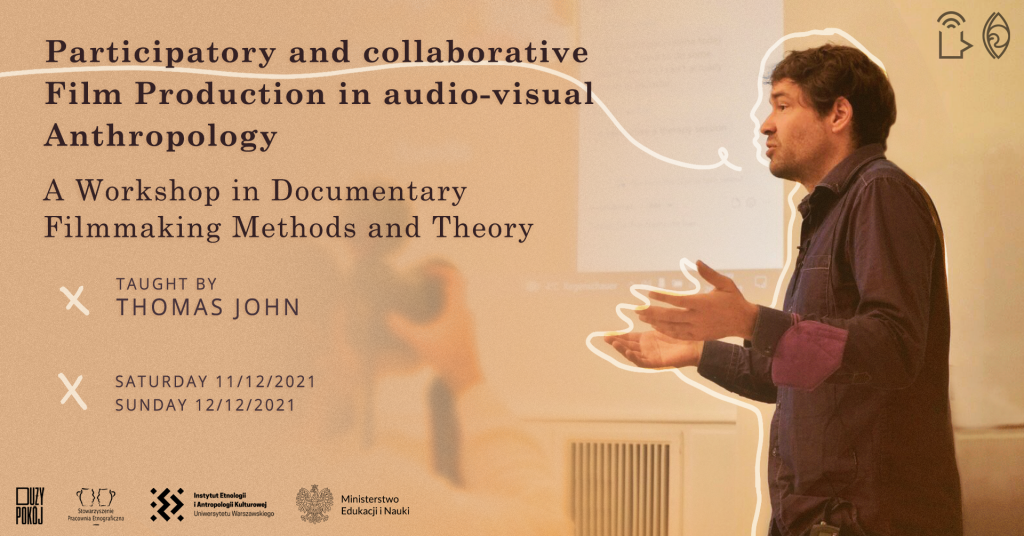Participatory and collaborative Film Production in audio-visual Anthropology
A Workshop in Documentary Filmmaking Methods and Theory
Taught by
Thomas John | Doctoral Researcher | FU Berlin & WWU Münster
Saturday 11/12/2021 10:00-17:00
Sunday 12/12/2021 10:00-15:00
Pracownia Duży Pokój, ul. Warecka 4/6, Warszawa
If you wish to attend please fill in the application form at the bottom of the page.

This class introduces participants briefly to the history of documentary film and audio-visual anthropology (ethnographic film). We deal with important debates, films styles and narrative strategies in documentary film (modes of representation) and related audio-visual methods of social research & film production. However, in a second step our main focus will be participatory and collaborative approaches to filmmaking and qualitative research. These approaches gained increasingly importance in academia but also in other fields of cultural knowledge production, such as in exhibition design and curating but also in theatre or literature amongst others.
This workshop is a practical and theoretical class. Participants will try out and practice a few video assignments with the camera to explore narrative strategies and techniques. However, we also deal with a few selected theoretical perspectives from audio-visual anthropology, particularly with approaches of the aforementioned participatory and collaborative filmmaking methods.
The central issue of participatory perspectives is, how a film production, documentary or art project can creatively benefit from involving its subjects as close collaborators and co-authors, in order to bring across the insider’s perspective and a notion of honesty, equality and authenticity? Another central ethical and representational question is, how we can represent other people and people’s subjectivity, emotions and their social/cultural realities WITH them together in collaboration, instead of merely writing, filming, photographing and working ABOUT them?
There are several ways in documentary film production to implement participatory and collaborative methods and formats. Participation can go as far as that a film-subject (protagonist) becomes a co-author, a co-camera women or a co-editor of a film. However, Participatory film could also apply methods close to photo/video elicitation, meaning, that protagonists contribute photo or video footage on their own, for instance smartphone video diaries, home movies, or smartphone media archives. Another form of participation is that a filmmaker participates in her own film as a subject, too. We are going to watch film excerpts of such audio-visual works but we also try out practically in class, with the camera, to experience what is does mean and how it does feel like to be represented on film, but vice versa also to experience how it feels to represent somebody else, to explore methods and perspectives of mutual collaboration in filmmaking processes.
Thomas John is a visual and media anthropologist, lecturer, researcher and filmmaker. He developed and co-directs the MA Visual Anthropology, Media and Documentary Practices at WWU Münster, but lives and works in Berlin as doctoral researcher affiliated with the Institute of Social and Cultural Anthropology.
Zasady uczestnictwa w warsztacie:
- Warsztaty przewidujemy w formie stacjonarnej, jednak w wypadku nowych obostrzeń lub innych sytuacji losowych Organizator zastrzega możliwość zmiany formuły na warsztaty online lub hybrydowe.
- Udział w warsztatach jest bezpłatny. Organizator nie zapewnia posiłku w trakcie warsztatów.
- Do zapisu zapraszamy osoby zaszczepione na covid-19 lub mające status ozdrowieńca.
- Liczba miejsc ograniczona – będziemy brać pod uwagę kolejność zgłoszeń oraz motywację do udziału w warsztatach. W przypadku większej liczby zgłoszonych osób powstanie również lista rezerwowa.
- Zapraszamy osoby zdrowe, niemające objawów chorobowych sugerujących chorobę zakaźną, które w okresie ostatnich 14 dni przed spotkaniem: nie miały świadomego kontaktu lub nie zamieszkiwały z osobą przebywającą na kwarantannie lub w izolacji w warunkach domowych ani nie miały świadomego kontaktu z osobą zakażoną koronawirusem.
- Wszystkie osoby znajdujące się na sali zobowiązane są do zasłaniania ust i nosa za pomocą maseczek.
- Organizator dokłada wszelkich starań w celu minimalizacji ryzyka zakażenia, jednak należy mieć świadomość, iż nie da się go w pełni wyeliminować.
- Szczegółowa lista uczestników wraz z danymi kontaktowymi będzie przechowywana przez Organizatora przez min. 14 dni po warsztatach, w celu ewentualnej informacji w przypadku wystąpienia zakażenia.
- Na wszystkie spotkania rejestracja prowadzona jest za pośrednictwem formularza internetowego. Nie jest możliwe dołączenie do spotkania bez wcześniejszego zapisu.
- Zgoda na powyższe zasady jest warunkiem uczestnictwa w spotkaniach.
Dofinansowano z programu „Społeczna odpowiedzialność nauki” Ministra Edukacji i Nauki.
